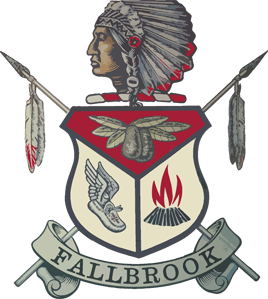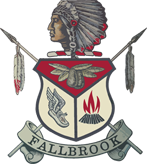Social Studies
Welcome to the Social Studies Department!

The mission of the social studies department at Fallbrook High School is to develop responsible and productive citizens who will:
- Strive for understanding of political, social and economic issues.
- Make informed and reasoned decisions for the good of society.
- Participate as members of a culturally diverse society in an interdependent world.
As a result of participating in the FHS social studies program, students will be able to independently …
- participate actively and effectively as an informed citizen of a democracy;
- critically appraise historical and contemporary claims/decisions/issues;
- respect diverse cultures and honor equality and human dignity;
- apply lessons of the past in order to anticipate and prepare for the future;
- analyze the complex interactions between humans and the environment;
- apply economic principles to solve complex problem
Courses
Honors World History - 9th Grade
In a more in-depth and fast paced learning environment, this course provides a chronological exploration of World History, including geographical and cultural influences. Themes include political change, economic development, growth of science and technology, effects of contact between cultures, and creativity in the arts. Skill emphasis will include critical thinking, critical analysis, reading, speaking, note taking, writing and research. Modeling the California Social Science framework and in accordance with California state standards, this course focuses on modern western civilization. Specific topics covered include the rise of democratic ideals from ancient Greece through modern times. Discussions will emphasize areas of industrialization, imperialism, and the world wars. Emphasis will also be placed on geographic, political, social, and economic forces behind today’s world.
College Prep World History - 10th Grade
A chronological exploration of World History, including geographical and cultural influences. Themes include political change, economic development, growth of science and technology, effects of contact between cultures, and creativity in the arts. Skill emphasis will include critical thinking, critical analysis, reading, speaking, note taking, writing and research. Modeling the California Social Science framework and in accordance with California state standards, this course focuses on modern western civilization. Specific topics covered include the rise of democratic ideals from ancient Greece through modern times. Discussions will emphasize areas of industrialization, imperialism, and the world wars. Emphasis will also be placed on geographic, political, social, and economic forces behind today’s world.
AP European History - 10th Grade
The AP European History course focuses on developing students’ understanding of European history from approximately 1450 to the present. The course has students investigate the content of European history for significant events, individuals, developments, and processes in four historical periods, and develop and use the same thinking skills and methods (analyzing primary and secondary sources, making historical comparisons, chronological reasoning, and argumentation) employed by historians when they study the past. The course also provides five themes (interaction of Europe and the world; poverty and prosperity; objective knowledge and subjective visions; states and other institutions of power; and individual and society) that students explore throughout the course in order to make connections among historical developments in different times and places.
This is a weighted course.
College Prep American History - 11th Grade
The course is aligned with the California framework and state standards and is a review of the events in American history that took place from the age of the exploration to the end of the 19th century. This review is conducted while emphasizing the events beginning with the progressive era to the present day. Geographic, political, social, and economic forces are also emphasized during this course as well as the contributions of minorities and women to the evolution of the 20th century. This course focuses on skills development and critical thinking.
AP United States History - 11th Grade
The AP U.S. History course focuses on the development of historical thinking skills (chronological reasoning, comparing and contextualizing, crafting historical arguments using historical evidence, and interpreting and synthesizing historical narrative) and the development of students’ abilities to think conceptually about U.S. history from approximately 1491 to the present. Seven themes of equal importance – American and National Identity; Migration and Settlement; Politics and Power; Work, Exchange, and Technology; America in the World; Geography and the Environment; and Culture and Society – provide areas of historical inquiry for investigation throughout the course. These require students to reason historically about continuity and change over time and make comparisons among various historical developments in different times and places.
This is a weighted course.
College Prep Government & Economics - 12th Grade
Government - In this course, students will learn to compare systems of government in the world today and analyze the life and changing interpretations of the Constitution, the Bill of Rights, and the current state of the legislative, executive, and judicial branches of government. An emphasis is also placed on analyzing the relationship among federal, state and local governments as well as promoting civic literacy as students prepare to vote. Students are exposed to the U.S. Government Structure, systems and political processes focusing on constitutional structures and foundations.
Economics - This course provides an overview of the American economic system. Whereby all elements of the economy will be analyzed in the study of macroeconomic and microeconomic theory. The purpose of this course on Economics is to aid in gaining an understanding of the basic principles of the American economic system and that of other countries. Additionally, students will gain knowledge of economic principles such as production, supply and demand, stock market money, credit, banking, personal income, the government and its economy, and major economic problems.
AP US Government & Politics
AP United States Government and Politics introduces students to key political ideas, institutions, policies, interactions, roles, and behaviors that characterize the political culture of the United States. The course examines politically significant concepts and themes, through which students learn to apply disciplinary reasoning assess causes and consequences of political events, and interpret data to develop evidence-based arguments.
AP Government is taken in conjunction with College Prep Economics.
This is a weighted course.


